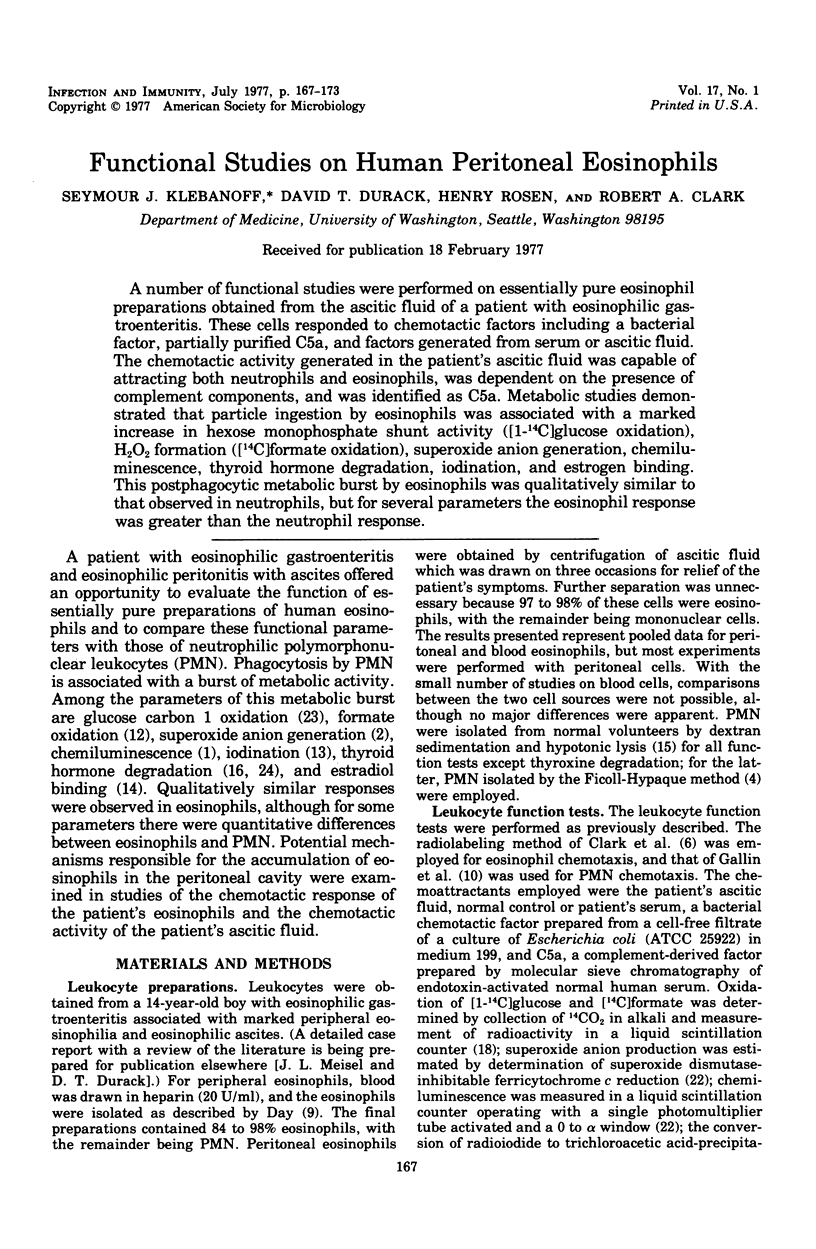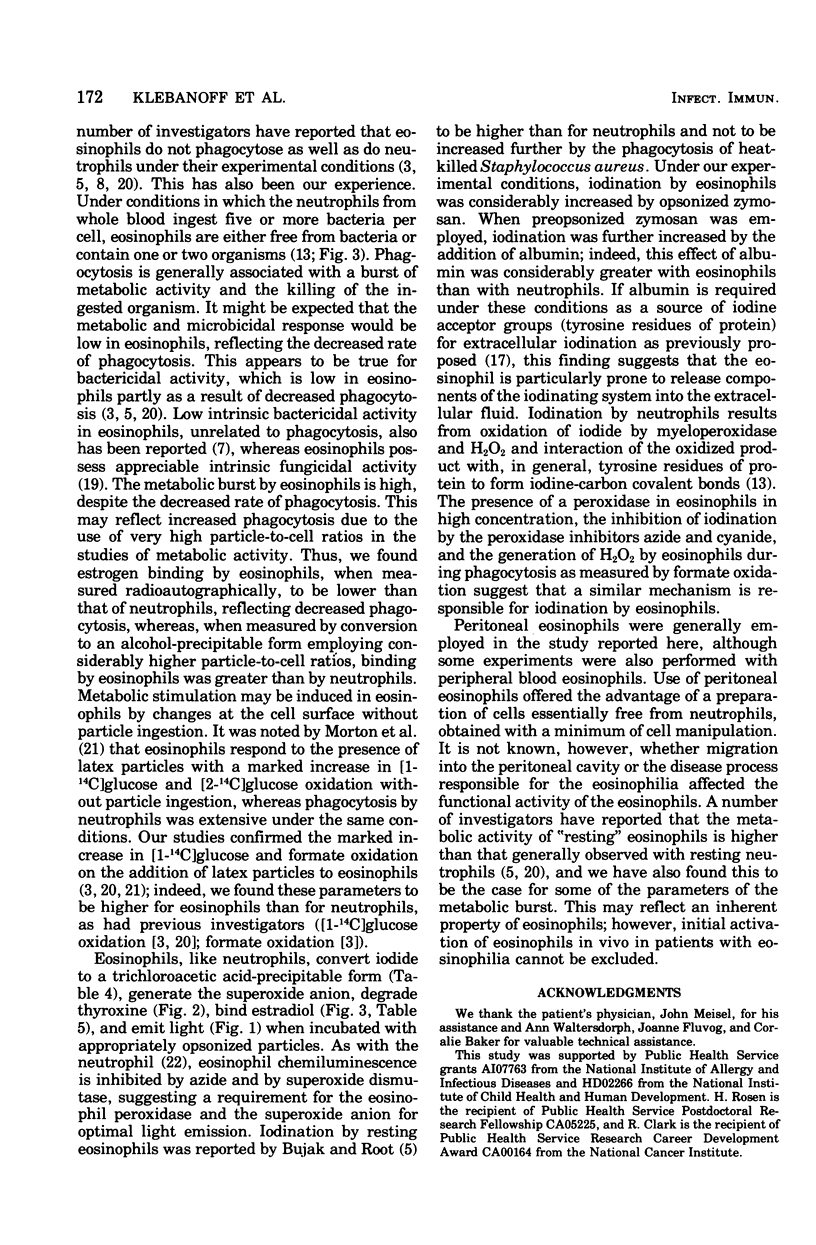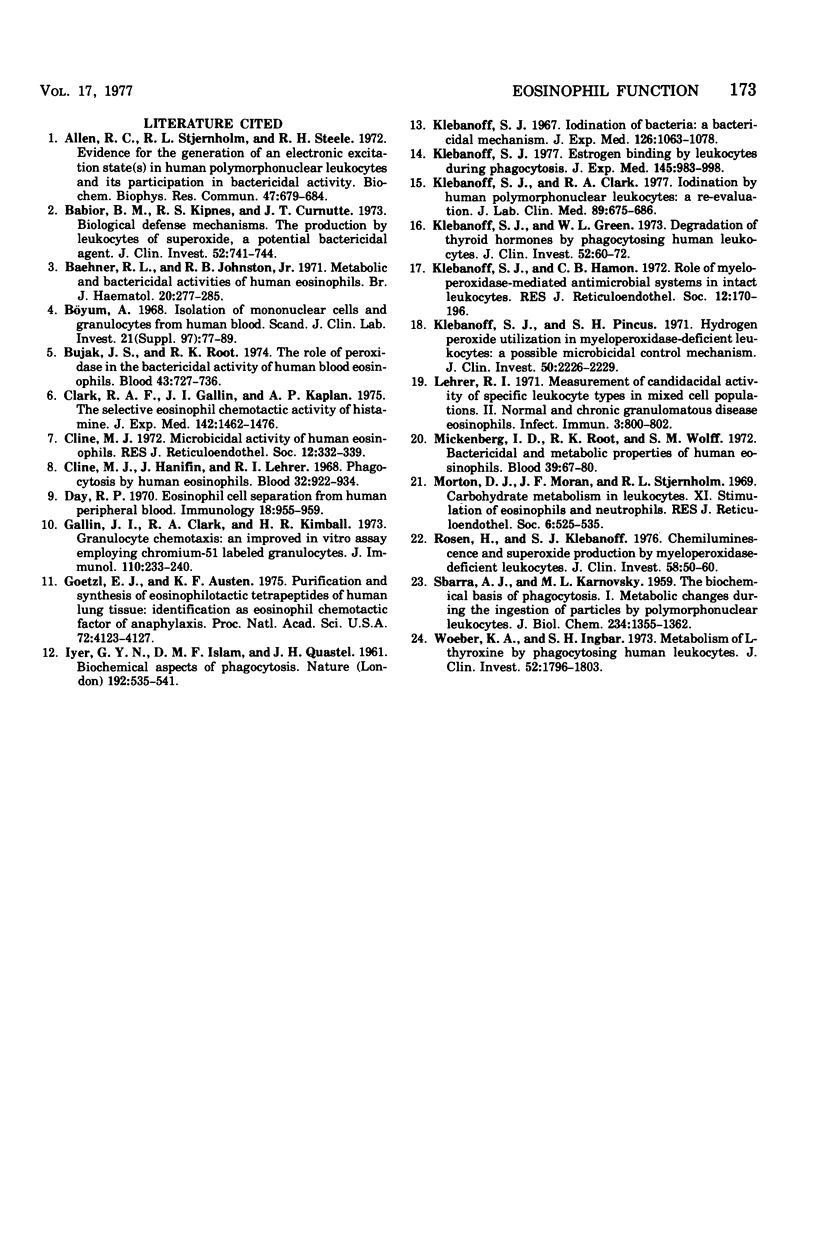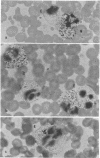Abstract
A number of functional studies were performed on essentially pure eosinophil preparations obtained from the ascitic fluid of a patient with eosinophilic gastroenteritis. These cells responded to chemotactic factors including a bacterial factor, partially purified C5a, and factors generated from serum or ascitic fluid. The chemotactic activity generated in the patient's ascitic fluid was capable of attracting both neutrophils and eosinophils, was dependent on the presence of complement components, and was identified as C5a. Metabolic studies demonstrated that particle ingestion by eosinophils was associated with a marked increase in hexose monophosphate shunt activity ([1-14C]glucose oxidation), H2O2 formation ([14C]formate oxidation), superoxide anion generation, chemiluminescence, thyroid hormone degradation, iodination, and estrogen binding. This postphagocytic metabolic burst by eosinophils was qualitatively similar to that observed in neutrophils, but for several parameters the eosinophil response was greater than the neutrophil response.
Full text
PDF






Images in this article
Selected References
These references are in PubMed. This may not be the complete list of references from this article.
- Allen R. C., Stjernholm R. L., Steele R. H. Evidence for the generation of an electronic excitation state(s) in human polymorphonuclear leukocytes and its participation in bactericidal activity. Biochem Biophys Res Commun. 1972 May 26;47(4):679–684. doi: 10.1016/0006-291x(72)90545-1. [DOI] [PubMed] [Google Scholar]
- Babior B. M., Kipnes R. S., Curnutte J. T. Biological defense mechanisms. The production by leukocytes of superoxide, a potential bactericidal agent. J Clin Invest. 1973 Mar;52(3):741–744. doi: 10.1172/JCI107236. [DOI] [PMC free article] [PubMed] [Google Scholar]
- Baehner R. L., Johnston R. B., Jr Metabolic and bactericidal activities of human eosinophils. Br J Haematol. 1971 Mar;20(3):277–285. doi: 10.1111/j.1365-2141.1971.tb07038.x. [DOI] [PubMed] [Google Scholar]
- Bujak J. S., Root R. K. The role of peroxidase in the bactericidal activity of human blood eosinophils. Blood. 1974 May;43(5):727–736. [PubMed] [Google Scholar]
- Böyum A. Isolation of mononuclear cells and granulocytes from human blood. Isolation of monuclear cells by one centrifugation, and of granulocytes by combining centrifugation and sedimentation at 1 g. Scand J Clin Lab Invest Suppl. 1968;97:77–89. [PubMed] [Google Scholar]
- Clark R. A., Gallin J. I., Kaplan A. P. The selective eosinophil chemotactic activity of histamine. J Exp Med. 1975 Dec 1;142(6):1462–1476. doi: 10.1084/jem.142.6.1462. [DOI] [PMC free article] [PubMed] [Google Scholar]
- Cline M. J., Hanifin J., Lehrer R. I. Phagocytosis by human eosinophils. Blood. 1968 Dec;32(6):922–934. [PubMed] [Google Scholar]
- Cline M. J. Microbicidal activity of human eosinophils. J Reticuloendothel Soc. 1972 Sep;12(3):332–339. [PubMed] [Google Scholar]
- Day R. P. Eosinophil cell separation from human peripheral blood. Immunology. 1970 Jun;18(6):955–959. [PMC free article] [PubMed] [Google Scholar]
- Gallin J. I., Clark R. A., Kimball H. R. Granulocyte chemotaxis: an improved in vitro assay employing 51 Cr-labeled granulocytes. J Immunol. 1973 Jan;110(1):233–240. [PubMed] [Google Scholar]
- Goetzl E. J., Austen K. F. Purification and synthesis of eosinophilotactic tetrapeptides of human lung tissue: identification as eosinophil chemotactic factor of anaphylaxis. Proc Natl Acad Sci U S A. 1975 Oct;72(10):4123–4127. doi: 10.1073/pnas.72.10.4123. [DOI] [PMC free article] [PubMed] [Google Scholar]
- Klebanoff S. J., Clark R. A. Iodination by human polymorphonuclear leukocytes: a re-evaluation. J Lab Clin Med. 1977 Mar;89(3):675–686. [PubMed] [Google Scholar]
- Klebanoff S. J. Estrogen binding by leukocytes during phagocytosis,. J Exp Med. 1977 Apr 1;145(4):983–998. doi: 10.1084/jem.145.4.983. [DOI] [PMC free article] [PubMed] [Google Scholar]
- Klebanoff S. J., Green W. L. Degradation of thyroid hormones by phagocytosing human leukocytes. J Clin Invest. 1973 Jan;52(1):60–72. doi: 10.1172/JCI107174. [DOI] [PMC free article] [PubMed] [Google Scholar]
- Klebanoff S. J., Hamon C. B. Role of myeloperoxidase-mediated antimicrobial systems in intact leukocytes. J Reticuloendothel Soc. 1972 Aug;12(2):170–196. [PubMed] [Google Scholar]
- Klebanoff S. J. Iodination of bacteria: a bactericidal mechanism. J Exp Med. 1967 Dec 1;126(6):1063–1078. doi: 10.1084/jem.126.6.1063. [DOI] [PMC free article] [PubMed] [Google Scholar]
- Klebanoff S. J., Pincus S. H. Hydrogen peroxide utilization in myeloperoxidase-deficient leukocytes: a possible microbicidal control mechanism. J Clin Invest. 1971 Oct;50(10):2226–2229. doi: 10.1172/JCI106718. [DOI] [PMC free article] [PubMed] [Google Scholar]
- Lehrer R. I. Measurement of Candidacidal Activity of Specific Leukocyte Types in Mixed Cell Populations II. Normal and Chronic Granulomatous Disease Eosinophils. Infect Immun. 1971 Jun;3(6):800–802. doi: 10.1128/iai.3.6.800-802.1971. [DOI] [PMC free article] [PubMed] [Google Scholar]
- Mickenberg I. D., Root R. K., Wolff S. M. Bactericidal and metabolic properties of human eosinophils. Blood. 1972 Jan;39(1):67–80. [PubMed] [Google Scholar]
- Morton D. J., Moran J. F., Stjernholmrl Carbohydte metabolism in leukocytes. XI. Stimulation of eosinophils and neutrophils. J Reticuloendothel Soc. 1969 Oct-Dec;6(5):525–535. [PubMed] [Google Scholar]
- Rosen H., Klebanoff S. J. Chemiluminescence and superoxide production by myeloperoxidase-deficient leukocytes. J Clin Invest. 1976 Jul;58(1):50–60. doi: 10.1172/JCI108458. [DOI] [PMC free article] [PubMed] [Google Scholar]
- SBARRA A. J., KARNOVSKY M. L. The biochemical basis of phagocytosis. I. Metabolic changes during the ingestion of particles by polymorphonuclear leukocytes. J Biol Chem. 1959 Jun;234(6):1355–1362. [PubMed] [Google Scholar]
- Woeber K. A., Ingbar S. H. Metabolism of L-thyroxine by phagocytosing human leukocytes. J Clin Invest. 1973 Aug;52(8):1796–1803. doi: 10.1172/JCI107361. [DOI] [PMC free article] [PubMed] [Google Scholar]



